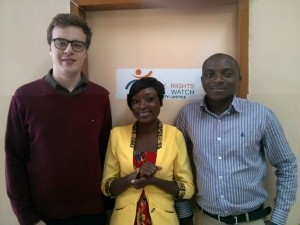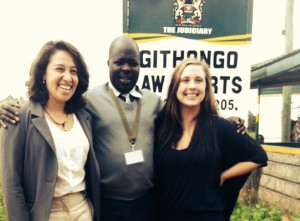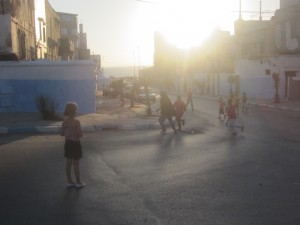Established in 2003 and administered by the Centre for Human Rights and Legal Pluralism (CHRLP) of McGill University, the International Human Rights Internship Program gives McGill Law students the opportunity to intern with NGOS, courts, and public institutions for a period of 12 weeks over the summer, while earning six credits toward their degree. This year, as every year, McGill Law students spent their time in cities and with organizations spanning the globe. Below are excerpts from some of their blog entries during their time away.
Olivier Beaubien – Disability Rights’ Watch, Zambia
« Un instrument juridique avec lequel j’ai beaucoup travaillé cet été à « Disability Rights Watch Zambia » est la Convention relative aux droits des handicapés de l’Organisation des Nations Unies. »
« Ce traité multilatéral, ratifié par 157 états, constitue indéniablement un accomplissement pour les droits des handicapés et les droits humains. Il est précurseur d’un changement de paradigme; plutôt que de définir un « handicap » comme une dysfonction du corps humain, la Convention le définit comme une conséquence de barrières créées par des sociétés inadaptées aux différences des personnes handicapées. »

« J’ai récemment participé à une conférence de la « Zambia Land Alliance » dans laquelle j’avais le mandat de représenter les difficultés – trop nombreuses – d’accès à la propriété que vivent les personnes handicapées. On m’a demandé mon opinion sur la mise en place de quotas pour assurer la distribution d’un minimum raisonnable de terres aux femmes et aux handicapés, et ce même dans les terres traditionnelles sous le contrôle des chefs. La question fut tout particulièrement difficile pour moi. L’histoire de la Zambie commande la prudence lorsque vient le temps d’imposer des lois remplaçant celles des peuples locaux, surtout si on est un étranger caucasien. »
« Alors que j’offrais une réponse nuancée digne du stéréotype de l’avocat, plusieurs membres présents ont appuyé la motion. D’autres ont proposé une collaboration avec les chefs et rappelé que certains de ces chefs avaient pris l’initiative de lutter, à l’intérieur même de leur « chiefdom », contre les mariages d’enfants. Cette intervention simple m’a fait chaud au cœur. Elle m’a laissé optimiste par rapport à l’exercice difficile mais important auquel doit se livrer la Zambie : l’articulation des droits humains fondamentaux dans une culture qui est la leur, et non pas par la culture des puissances impériales du passé. »
Brodie Noga – Cambodian League for the Promotion and Defense of Human Rights (LICADHO), Philippines
“I used to think that the phrase miscarriage of justice was oddly visceral. Having felt my heart slow, my chest become heavy, and my stomach wrench as the “Phnom Penh 11” were handed down 20 and seven year sentences in a deeply flawed legal proceeding after a mere 15 minutes of deliberation, it now feels sterile.”
“As students of law we often talk about justice and injustice, but it is nearly always in the abstract. The trial is far from the first terrible thing that I have witnessed, but the emotional charge that hung in the air as the verdict was read continues to haunt me. But it wasn’t the catalog of fair trial violations in my notebook that was disturbing, it was the performance of state power before me, it was the men aware of their looming sentence, it was the nervous energy of the audience, it was the rapidity of the judge’s speech as the sentence was read. Law in the abstract never really exists without law in the concrete. A miscarriage of justice isn’t just a failure of the court to abide by abstract codes of behaviour, it is the immensely visceral interaction between humans whose final reality exists in their flesh. For me and for those in the audience, the physicality of the injustice was vicarious. For those 11 who felt the handcuffs around their wrists, it was far more immediate.”
“The trial is nothing new or unexpected in Cambodia. Criminal charges have been used regularly in the past to give the ruling party bargaining leverage over the opposition.”
“This is of course troubling on a number of levels. But for a law student emerging from the depths of the academic study of law it represents the danger of learning law solely in the abstract. The law is found not just in its written form, rather it is a practiced enactment of state power.”
“This may seem like common sense, but it is easy enough to lose sight of when the immediate success in law school depends on your in-depth knowledge of the written law. If anything, this past week has made me reflect on how to be an effective advocate requires not just legal knowledge, but adeptness at negotiating the social and political context in which one is advocating.”
Maria Rodriguez – Equality Effect, Kenya
“I have crossed the half point of my internship in Kenya, and although this blog post was originally going to be about my experience as a white (mzungu [1]) girl in Kenya, I realized that there was something more important that I could share.”

“I am a law student, and while at law school I have learnt about substantive law and procedure, here in Kenya I have learnt that being a lawyer is not only about what you know but it is also about the relationships you are able to build with the people around you. In other words, relationship building has proven to be a key element of my work here in Kenya.”
“While going through the files and filing in forms are standard activities in most law-jobs (or any desk job for that matter), I have come to realize that the biggest and most important part of my work has been the fieldwork because of the human component. Indeed it is through my fieldwork that I have had the opportunity to meet and establish a relationship with police officers, magistrates, prosecutors, and other relevant stakeholders. These relationships have allowed me to learn much more than most of the paperwork because I have been able to engage in meaningful discussions about the law in Kenya, the value and place that children should have in society, and the different challenges that these stakeholders are facing when trying to seek justice for these girls.”
Dominic Bell – Maliiganik Tukisiiniakvik Legal Services, Iqualuit, Nunavut
During their summers, students at Maliiganik sometimes get the chance to travel on what is referred to as a “circuit court”. As the largest subdivision in Canada, access to justice in Nunavut is hindered by how interspersed the communities are across this great expanse of the far North. Just to give you an idea of the sheer magnitude, the distance from Pond Inlet to Montreal is about the same as the distance from Montreal to Jamaica; and yet, both are located in the same country.

I travelled on circuit from July 17-24th. Our trip began with a short layover in Clyde River. Thereafter, we continued to our destination. I am positively confident in saying that Pond Inlet is the most beautiful place I have ever visited. The view from our hotel (the Black Point Lodge) spanned a large bay of ice blocks drifting gently with the current, and across the blue water stood the mountain range of Bylot Island: a bird sanctuary. From higher up, Mount Yerodia was visible to the east and the distance to both was underscored by how spectacular the view was.
The day after arrival, we began preparations for the court circuit by interviewing clients, potential witnesses, etc. The two lawyers and court worker who I accompanied on this trip, worked tirelessly throughout the weekend to ensure that we were prepared for court on Monday. In turn, I assisted in interviewing clients and witnesses, and prepared some youth cases as well. Moreover, when the Crown prosecutors arrived later, I helped negotiate some joint positions. This was a fantastic learning experience as I spoke to summary matters in court for the first time.

The beauty of Pond Inlet and the learning opportunity I have described mask the extreme pain which I witnessed during my time in the North. Many of our clients have endured some absolutely horrific events in their lives and some of the trials were difficult to listen to at times. The complexity of the situation is brought into full light when one considers present offences through a neo-colonial lens and sees the court as a continuing vehicle for past colonial injustices. Indeed, there is a lingering feeling that justice is happening tothe Inuit rather than for them. Conversely, I am sensitive to the plight of the complainants who were often women and children.
There is quite simply, no simple answer.
Sarah Chênevert-Beaudoin – Conseil National des droits de l’homme, Rabat, Maroc

Certains des étudiants de McGill font leur stage dans des tribunaux ruraux, d’autres sillonnent le pays pour rencontrer des membres d’ONG diverses, d’autres encore visitent des lieux de détention. Ils sont sur le ‘terrain’. Moi, je compile des recommandations. Législatives. Internationales. De politiques publiques. Mon introduction aux droits humains passe par le texte. Les mots. Des milliers de mots. Loin des gens qui sont directement victimes des violations de leurs droits, à des milliers de kilomètres du camp de réfugiés de Tindouf, de la prison de Tétouan.
D’une part, je suis convaincue de l’importance de ces infrastructures de mots. Des administrations complètes, leurs mandats et leurs limites émanent de ces feuilles de papier. Suite à l’adoption en 2011 d’une nouvelle Constitution qui consacre la division des pouvoirs et garantit les droits et libertés fondamentaux, le Maroc est en plein processus de réforme, de révision, d’amendement et de refonte de ses textes législatifs.
Par exemple, le Conseil National des Droits de l’Homme (CNDH) est très impliqué dans la réforme du Code pénal et du Code de procédure pénale, réforme urgente et nécessaire pour pouvoir lutter contre la violence à l’égard des femmes, entre autres. Car si l’article 19 de la Constitution consacre l’égalité entre la femme et l’homme, deux femmes sont actuellement accusées d’outrage public à la pudeur sous l’article 483 du Code pénal, infraction passible de 1 mois à 2 ans de prison. Ce qu’elles ont fait? Porter des robes jugées trop courtes pour faire le marché pendant Ramadan. Une importante partie de la société civile et des médias se mobilisent pour dénoncer cette accusation et l’existence de cet article dans le Code Pénal. Les mouvements de contestation s’organisent autour du 6 juillet, la date prévue pour le procès. Voilà pour l’importance d’harmoniser les textes avec les textes, de rendre cohérentes et actuelles les diverses architectures législatives – de compiler, de lire, de rédiger des propositions d’amendements en espérant que le gouvernement s’en inspirera.
J’ai la chance de faire ce stage accompagnée de ma famille – mon conjoint et mes deux filles de 4 et 7 ans respectivement. La plus vieille est actuellement en train de passer des livres imagés aux livres qui sont uniquement composés de texte. Elle est férue de lecture. La semaine passée, nous lui avons acheté un roman marocain sur une princesse-sorcière berbère. Elle l’a dévoré sur le chemin qui mène aux magnifiques collines de Chefchaouen. De quoi avait l’air la princesse Kaina dans sa petite tête de Montréalaise? Quels types de paysages a-t-elle imaginés pour y faire vivre son héroïne? Peut-être que le paysage qui défilait par la fenêtre arrière de la voiture de location lui a permis de mettre des odeurs et des couleurs à la vie de sa princesse berbère? Peu importe, elle était émue par la lecture, transportée. Ceux qui aiment lire se souviendront du premier livre qui vous a complètement chaviré, hanté, transformé. Le pouvoir magique des mots.
Jessica De Santi – Mahanirban Calcutta Research Group (CRG), Calcutta, India
“On my second weekend in Kolkata, I went to a street dance battle.”
“As a member of Montreal’s street dance community (though with much less involvement than I would like, such is the life of a student) and a lifelong dancer, I was not looking forward to a summer without dance. A couple of friends in Mumbai connected me to some lockers in Kolkata. As it happened, on my second Sunday in Kolkata, there was both a locking class and a battle, so I took the opportunity and went to both.”
“Dance battles are arguably an integral part of street dance culture, and hip-hop culture more generally. To oversimplify almost unforgivably, hip-hop culture finds its roots in Black and Latin communities, particularly the Bronx, in the United States in the wake of the Civil Rights Movement. The battle I went to was called Cypherology, a name which itself evokes other aspects of the culture: the cypher, a coming-together of dancers who take turns dancing and exchanging at the centre of a circle; and the suffix “-ology,” literally “study of,” a recurring theme for street dancers.”
“Being in a room full of dancers, dancing, and great music, for the first time in the two weeks I had been in Kolkata, I felt at home. In the culture, we often talk about the importance of values such as peace, love, unity, and having fun (see supra, but also here for a live representation). At Cypherology, on the dance floor and in conversation with other dancers, I saw, felt, and breathed those ideas, for which I am truly grateful.”
